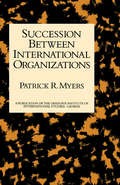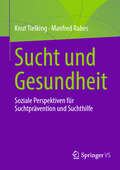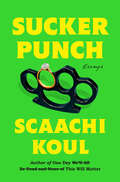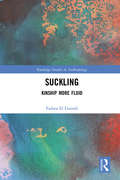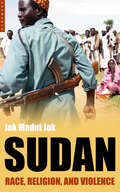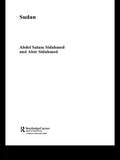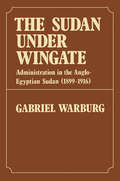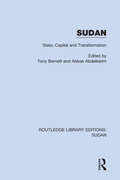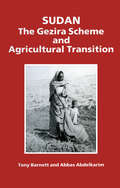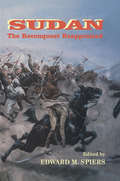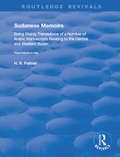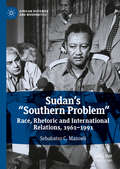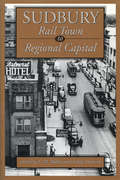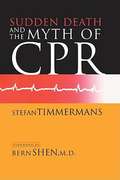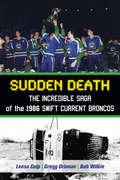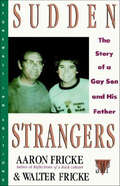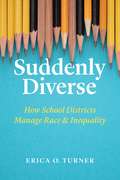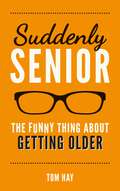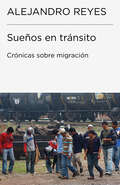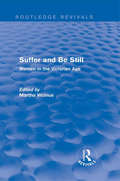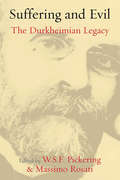- Table View
- List View
Succession Between Internl Organ
by MyersFirst Published in 1993. Routledge is an imprint of Taylor & Francis, an informa company.
Sucht und Gesundheit: Soziale Perspektiven für Suchtprävention und Suchthilfe
by Knut Tielking Manfred RabesDas Buch bietet einen komprimierten und zugleich ausführlichen Überblick über Suchtprobleme aus einer sozialarbeiterischen und sozialwissenschaftlichen Perspektive. Herausgearbeitet wird die Suchtthematik im Kontext von Gesundheit unter Berücksichtigung wesentlicher Suchtformen, deren Ursachen und Entstehungsbedingungen und der relevanten epidemiologischen Datenlage. Zudem wird das Suchthilfesystem in seinen Facetten (Prävention, Beratung, Behandlung, Begleitung) beleuchtet und es werden neue Erkenntnisse und offene Fragen in der Suchtforschung diskutiert. Evidenzbasierung und soziokulturelle Aspekte sind hierbei integrierte Bestandteile.
Sucker Punch
by Scaachi Koul"Koul puts on a breezy and fleetingly filthy sideshow, but when she writes about gender and race she reveals that knife-throwing is her main act." —The New York TimesNamed by Vulture and Literary Hub as one of 2025's Most Anticipated ReleasesNamed one of Electric Literature's '48 Books by Women of Color to Read in 2025' From the cultural critic and bestselling author of One Day We&’ll All Be Dead and None of This Will Matter comes a poignant, bitingly funny, and unabashedly candid new memoir in essays.Scaachi Koul&’s first book was a collection of raw, perceptive, and hilarious essays reckoning with the issues of race, body image, love, friendship, and growing up the daughter of immigrants. When the time came to start writing her next book, Scaachi assumed she&’d be updating her story with essays about her elaborate four-day wedding, settling down to domestic bliss, and continuing her never-ending arguments with her parents. Instead, the Covid pandemic hit, the world went into lockdown, Scaachi&’s marriage fell apart, she lost her job, and her mother was diagnosed with cancer. Sucker Punch is about what happens when the life you thought you&’d be living radically changes course, everything you thought you knew about the world and yourself has tilted on its axis, and you have to start forging a new path forward. Scaachi employs her signature humour and fierce intelligence to interrogate her previous belief that fighting is the most effective tool for progress. She examines the fights she&’s had—with her parents, her ex-husband, her friends, online strangers, and herself—all in an attempt to understand when a fight is worth having, and when it's better to walk away.
Suckling: Kinship More Fluid (Routledge Studies in Anthropology)
by Fadwa El GuindiA ground-breaking ethnographic study of suckling in the Arabian Gulf , this book reenergises the study of kinship. It analyses the misunderstood and marginalized phenomenon of suckling drawing on ethnographic fieldwork in Qatar over a seven-year period. Fadwa El Guindi situates suckling (often given other names or subsumed under misleading classifications) squarely in the analytical category of kinship, with recognition that kinship is necessarily biological, societal and cultural. The volume takes kinship study beyond origins, nature-culture debates, and social nurturing and relatedness, and challenges claims of deterministic, reductionist formulas. As well as key reading for those involved in milk kinship research, this book is valuable for anthropologists, Middle East scholars and others with an interest in breastfeeding, family and social organisation, and religion.
Sudan
by Jok Madut JokSudan is a country in turmoil, ravaged by civil war, and plagued by roaming gangs of rebel and government militia, with several million facing starvation and disease in Darfur. Tales of state-sponsored murder, genocide, and humanitarian crises are rife, and there is a real need for a measured investigation that carefully examines the causes of the troubles. In this important book, Jok Madut Jok delves deep into his country's culture and past, isolating the factors that cause its fractured national identity. Filled with sharp argument and illustrated with heroic real-life stories of the Sudanese people, Sudan will appeal to everyone who wishes to gain a greater understanding of the history and politics of this fascinating country.
Sudan (The Contemporary Middle East)
by Abdel Salam Sidahmed Alsir SidahmedStretching between the savannah and the equator, Sudan is a microcosm of Africa, with one leg in the Arab world and the other in Africa. Sudan's development, however, has failed to address the differences within the country between its diverse ethnic communities. This has resulted in political instability and a lack of national consensus, ultimately leading to long-term civil war.This useful book provides a comprehensive introduction to contemporary Sudan, outlining the evolution of the state with emphasis on its post-independence experience. It includes chapters on the history, politics, society, international relations and economy of the country.
Sudan After Nimeiri (SOAS/Routledge Studies on the Middle East)
by Peter WoodwardAt the end of 1984, Sudan shot into the headlines as a result of famines, floods, locusts, political instability and civil war. In describing the collapse of Sudan's state and economy, Sudan After Nimeiri emphasises the extent of the country's current predicament and explains the difficulty of potential solutions. Amongst the issues discussed are environmental and ecological problems, economic collapse, famine, debt, refugees, the role of Islam in Sudanese politics, Nimeiri's downfall and the administrative problems facing the transitional and present governments.
Sudan Under Wingate: Administration in the Anglo-Egyptian Sudan (1899-1916) (Routledge Revivals Ser.)
by Gabriel WarburgFirst Published in 1971. Routledge is an imprint of Taylor & Francis, an informa company.
Sudan: State, Capital and Transformation (Routledge Library Editions: Sudan)
by Tony Barnett Abbas AbdelkarimBy the mid-1980s, Sudan’s economy, society and political framework were on the point of disintegration. Civil war was exacerbating the effects of an already major famine. An unpopular government was resorting to ever more extreme measures in order to remain in power. The imposition of a particularly oppressive and hash interpretation of sharia law was heightening racial and religious tensions. Internationally, Sudan was faced by a debt crisis which was apparently insoluble, and which threatened to undermine completely what was left of the economy. This book, first published in 1988, examines the complex economic and social processes which led to this situation – emphasising the part played by the state itself. The book combines detailed multi-disciplinary analyses of Sudan in the post-colonial era with a consideration of possibilities for the future.
Sudan: The Gezira Scheme and Agricultural Transition
by Tony Barnett Abbas AbdelkarimThe authors propose that the Gezira scheme has played a paradoxical role in the capitalist transformation of the Sudan - reinforcing some non-capitalist production relations while at the same time acting as an engine for the peripheral capitalist development.
Sudan: The Reconquest Reappraised
by Edward M SpiersIn 1898, Kitchener's Anglo-Egyptian army defeated the armies of dervishes at the battle of Omdurman. To commemorate the event, 11 historians have produced a reappraisal of the reconquest and its international repercussions. They examine some of the policies, personalities and issues involved.
Sudanese Memoirs: Template Subtitle (Routledge Revivals)
by Herbert PalmerPublished in 1967: Sudanese Memoirs is a foremost contribution to the ethnological and historical literature of Western Africa. In three volumes, they comprise a large number of translations from Arabic manuscripts whcih were mostly collected in the northern emirates of Nigeria.
Sudan’s “Southern Problem”: Race, Rhetoric and International Relations, 1961-1991 (African Histories and Modernities)
by Sebabatso C. ManoeliThe book offers a history of the discourses and diplomacies of Sudan’s civil wars. It explores the battle for legitimacy between the Sudanese state and Southern rebels. In particular, it examines how racial thought and rhetoric were used in international debates about the political destiny of the South. By placing the state and rebels within the same frame, the book uncovers the competition for Sudan’s reputation. It reveals the discursive techniques both sides employed to elicit support from diverse audiences, amidst the intellectual ferment of Pan-Africanism, the Cold War, and Black liberation politics. It maintains that the interplay of silences and articulations in both the rebels' and the state’s texts concealed and complicated aspects of the country’s political conflict. In sum, the book demonstrates that the war of words waged abroad represents a strategic, but often overlooked, aspect of the Sudanese civil wars.
Sudbury: Rail Town to Regional Capital
by C. M. Wallace Ashley ThomsonAt the turn of the century Sudbury was a town set on the railway line, with a population of about 2,000. The community was smaller than Sault Ste. Marie and Copper Cliff to the west, and to the east, North Bay and Pembroke. Now, nearly 100 years later, Sudbury is the largest city in northeastern Ontario. it is also the centre of many governmental, business, social, educational, media, medical, and other professional services in the region. Sudbury: Rail Town to Regional Capital, which honours the centenary of the community’s incorporation as a town in 1893, analyses Sudbury decade by decade, describing the ongoing changes in the community and their impact on citizens. The book also examines the forces that shaped the city’s destiny and argues that Sudbury is far more than a single-industry town based on mining. Grounded in new research and written in an accessible style by a team of local scholars, the book, with numerous maps and photographs will appeal to urban historians as well as the general reader both within and beyond the city.
Sudden Death and the Myth of CPR
by Stefan TimmermansSudden Death and the Myth of CPR is for anyone who has taken a CPR course or who believes the images from television dramas. It is also for families of victims and survivors of CPR. It will engage emergency personnel, others in the medical field, and anyone concerned with ethical issues of death and dying. Anyone who has ever taken a CPR course has wondered, "What would happen if I actually had to use CPR?" In Western societies, the lifesaving power of resuscitation has the status of a revered cultural myth. It promises life in the face of sudden death, but the reality is that lives are rarely saved. Medical researchers estimate the survival rate for out-of-hospital CPR to be between 1 and 3 percent. Sudden Death and the Myth of CPR explores the history of this medical innovation and the promotion of its effectiveness. The overuse of resuscitation, Timmermans explains, defines people's experience with sudden death, something he learned firsthand by following the practice of lifesaving from street corner to emergency room. He argues that very few people are successfully resuscitated without brain damage despite the promotion of CPR's effectiveness through powerful media images. In vivid accounts of the day-to-day practices of cardiopulmonary resuscitation in one of the only studies o f sudden death, Timmermans records the astonishingly frank comments of emergency personnel. Doctors, nurses, social workers, and paramedics express emotions from cynicism about going through the futile motions to genuine concern for victims' family members. If a person who was supposed to keep on living dies at the end of a resuscitative attempt, how socially meaningful is the dying? Timmermans asks tough questions and addresses the controversial ethical issues about the appropriateness of interfering with life and death. He suggests policy reform and the restoration of dignity to sudden death.
Sudden Death: The Incredible Saga of the 1986 Swift Current Broncos
by Brian Costello Leesa Culp Gregg Drinnan Bob WilkieA true story of hockey heartbreak, tragedy, and triumph. Limited time offer. Sudden Death brings to life the incredible ongoing saga of the Swift Current Broncos hockey team. After a tragic game-day bus accident on December 30, 1986, left four of its star players dead, the first-year Western Hockey League team was faced with nearly insurmountable odds against not only its future success but its very survival. The heartbreaking story made headlines across North America, and the club garnered acclaim when it triumphantly rebounded and won the Canadian Hockey League’s prestigious Memorial Cup in 1989. Many of the surviving Broncos continued their successful hockey careers in the NHL, among them 2012 Hockey Hall of Famer Joe Sakic, Sheldon Kennedy, and Sudden Death co-author Bob Wilkie. Years later the Broncos’ tragedy-to-triumph tale was overshadowed when the team’s former coach, Graham James, was convicted of sexual assault against Sheldon Kennedy, Theoren Fleury, and Todd Holt, all of whom played for him.
Sudden Stops and Optimal Self-Insurance
by Jun Il KimA report from the International Monetary Fund.
Sudden Strangers: The Story of a Gay Son and His Father
by Aaron Fricke Walter Fricke"This is a story about Walter Fricke and Aaron Fricke, father and son, heterosexual and gay (respectively on all counts). . . ."It has taken six years to complete this book. During that time, there were periods when it was worked on steadily and times when the material was abandoned as hopeless. The book changed as our father/son relationship changed, and each transformation of the book reflected the transformations in our relationship. It is neither the same book nor the same relationship that we started with six years ago. This was a book that had to be lived, not simply written."The final product is the story of an evolving father/son relationship, a story of two people with different ways of looking at the world, and of the hurdles we needed to overcome to respect each other."
Suddenly Diverse: How School Districts Manage Race and Inequality
by Erica O. TurnerFor the past five years, American public schools have enrolled more students identified as Black, Latinx, American Indian, and Asian than white. At the same time, more than half of US school children now qualify for federally subsidized meals, a marker of poverty. The makeup of schools is rapidly changing, and many districts and school boards are at a loss as to how they can effectively and equitably handle these shifts.Suddenly Diverse is an ethnographic account of two school districts in the Midwest responding to rapidly changing demographics at their schools. It is based on observations and in-depth interviews with school board members and superintendents, as well as staff, community members, and other stakeholders in each district: one serving “Lakeside,” a predominately working class, conservative community and the other serving “Fairview,” a more affluent, liberal community. Erica O. Turner looks at district leaders’ adoption of business-inspired policy tools and the ultimate successes and failures of such responses. Turner’s findings demonstrate that, despite their intentions to promote “diversity” or eliminate “achievement gaps,” district leaders adopted policies and practices that ultimately perpetuated existing inequalities and advanced new forms of racism. While suggesting some ways forward, Suddenly Diverse shows that, without changes to these managerial policies and practices and larger transformations to the whole system, even district leaders’ best efforts will continue to undermine the promise of educational equity and the realization of more robust public schools.
Suddenly Senior: The Funny Thing About Getting Older
by Tom HayYou might be getting a bit thin on top, plump at the middle and creaky around the knees, but that doesn’t mean you’ve forgotten how to enjoy yourself! This collection of witty quotations, light-hearted yarns and cheerful jokes will help you celebrate getting older with a smile on your face and a twinkle in your wrinkle.
Suddenly Senior: The Funny Thing About Getting Older
by Tom HayYou might be getting a bit thin on top, plump at the middle and creaky around the knees, but that doesn’t mean you’ve forgotten how to enjoy yourself! This collection of witty quotations, light-hearted yarns and cheerful jokes will help you celebrate getting older with a smile on your face and a twinkle in your wrinkle.
Sueños de los niños del mundo (¡Arriba la Lectura! Read Aloud Module 10 #3)
by Takashi OwakiNIMAC-sourced textbook
Sueños en tránsito: Crónicas de migración
by Alejandro ReyesCinco crónicas sobre una de las poblaciones más vulnerables e invisibles del planeta. Cinco crónicas sobre una de las poblaciones más vulnerables e invisibles del planeta, de aquellos que dejan familias y hogares en busca de una vida digna, sometiéndose al trato más inhumano tanto por el crimen organizado como por las autoridades; en un flujo triturador de vidas que las más de las veces convierte los sueños en pesadillas: los migrantes. Desde Centroamérica a Estados Unidos, pasando por México, las historias se repiten una y otra vez: robos, violaciones, secuestros, amenazas, extorsiones, asesinatos. Con impactantes e íntimos encuentros con quienes han sufrido estas situaciones, el autor nos invita a reflexionar sobre este problema. "La intención de quienquiera que escriba con compromiso y seriedad sobre la catástrofe humana que significa la migración forzada, no puede ser otra sino el intento por despertar colectivamente de un sueño-pesadilla en elque todos, de una u otra forma, participamos."
Suffer and Be Still: Women in the Victorian Age (Routledge Revivals)
by Martha VicinusFirst published in 1972, this book contains a collection of ten essays that document the feminine stereotypes that women fought against, and only partially erased, a hundred years ago. In an introductory essay, Martha Vicinus describes the perfect Victorian lady, showing that the ideal was a combination of sexual innocence, conspicuous consumption and worship of the family hearth. Indeed, this model in some form was the ideal of all classes as the perfect lady’s only functions were marriage and procreation. The text offers a valuable insight into Victorian culture and society.
Suffering And Evil
by Massimo Rosati W.S.F. PickeringUntil recently the subject of suffering and evil was neglected in the sociological world and was almost absent in Durkheimian studies as well. This book aims to fill the gap, with particular reference to the Durkheimian tradition, by exploring the different meanings that the concepts of evil and suffering have in Durkheim's works, together with the general role they play in his sociology. It also examines the meanings and roles of these concepts in relation to suffering and evil in the work of other authors within the group of the Année sociologique up until the beginning of World War II. Finally, the Durkheimian legacy in its wider aspects is assessed, with particular reference to the importance of the Durkheimian categories in understanding and conceptualizing contemporary forms of evil and suffering.
